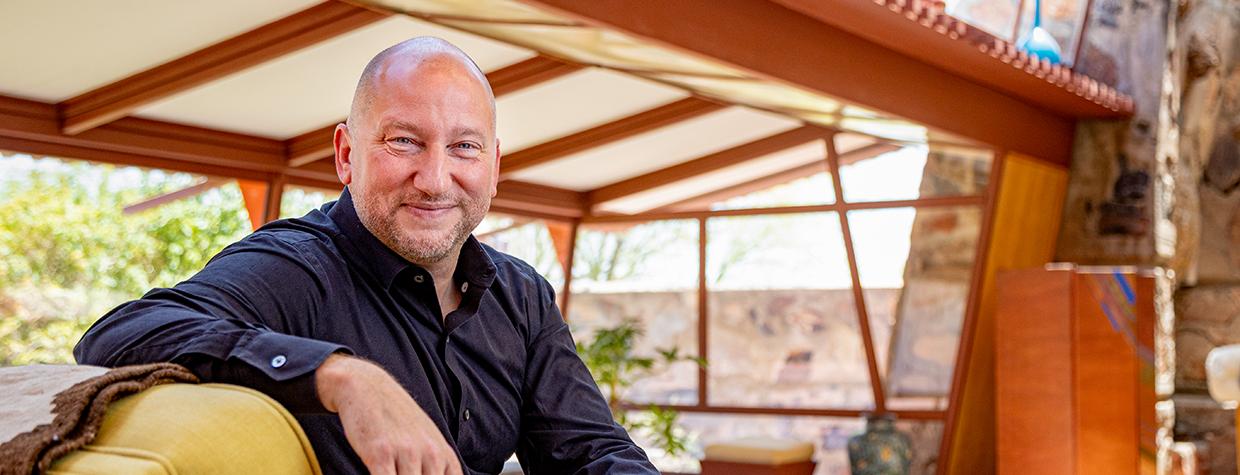Frank Lloyd Wright had no regard for the tall. That’s a reminder many visitors receive when they explore Taliesin West, the legendary architect’s winter headquarters in Scottsdale. During Wright’s career and in the decades since his death, his commitment to intimate interiors has often meant watching one’s head — or, for his more vertical associates, being told by Wright himself to sit down because they were “spoiling the scale.”
Joseph Specter knows about scales of a different kind. After a long career in opera — one that began as a singer and ended with running Arizona Opera for nearly a decade — he took over in May as president and CEO of the Frank Lloyd Wright Foundation, which owns and maintains both Taliesin West and Taliesin, its counterpart in Wright’s native Wisconsin.
At first, it feels like an unlikely career change. But Specter says there’s an implicit connection between the performing arts and architecture — particularly when it comes to Wright, who infused music and other art forms into his designs as he sought to inspire and connect people in Arizona and elsewhere.
“Opera has an incredible power to move people’s spirits, but it nevertheless is obscured from view for a lot of people who’ve never experienced it before or might have preconceived notions about it,” Specter says. “And as huge as the platform of architecture, and specifically Frank Lloyd Wright, may be, I think there are a lot of people whose lives haven’t been shifted positively in the way they could be if they felt a connection to the work the foundation does.”
Born in Maryland and raised in Florida, Specter spent most of his life on the East Coast, singing and working in financial services, until 2012, when he headed to Texas to run Austin Opera. In 2016, he and his family — his wife, Kate, and their daughters, Sophie and Charlotte — continued west to Arizona. “I’ve been surprised and delighted at how welcoming this community has been,” he says.
Specter celebrated that community in his role as Arizona Opera’s president and general director, prioritizing performances that had strong local resonance. In 2019, that emphasis led him to a more explicit connection to architecture: a reimagining of Shining Brow, a Daron Hagen opera based on Wright’s life that premiered in Wisconsin in 1993.
“Wright is such a giant presence here in Arizona, and obviously beyond,” Specter says. “I thought, Wouldn’t it be special to be able to produce Shining Brow here?” That opera, though, had been created for a large orchestra in a large space, and Arizona Opera would be performing it in smaller theaters in Phoenix and Tucson. The group worked with Hagen to create a smaller-scale equivalent, which became the well-received “Taliesin West Version” of Shining Brow.
That experience may have been the start of Specter’s next career stop, but he says he didn’t begin seriously considering the move until last year. “I’m so incredibly proud of everything we did with Arizona Opera — the programs and productions we created, the amount of reach we achieved,” he says. “But the brand of Frank Lloyd Wright and this organization, and the global awareness of that, did feel like a bully pulpit, and quite a broad one. And that was really thrilling, the idea of being part of that.”
Now, Specter is leading the foundation’s staff of more than 100 and working to further its mission, which includes preserving both Taliesin facilities and sharing Wright’s philosophy with students and the broader public through programming and tours. Mark Dreher, chairman of the board of trustees, hopes to see the work in Arizona go beyond Taliesin West via offsite and digital programs. And he’s confident Specter is the right person to pursue that and other foundation priorities.
“We didn’t need a technician — someone who knows everything about Frank Lloyd Wright, architecture or preservation — because we’ve got those people on staff,” Dreher says. “We’re a pretty diverse organization, and we do a lot of different things. To be able to pull all that together, you need someone who is an experienced leader. With Joe’s proven leadership and advancement skills everywhere he’s been, that made him a good fit for us.”
And, perhaps, for this moment, when public funding for arts and culture — something from which the foundation has benefited in the past — has become a political talking point. “There certainly will be a focus on making sure the resources are here,” Specter says. “We’re going to be looking to the community to help support that. And our commitment is that we’re delivering such value to the community that we’re worthy of that support.”
Political moments come and go, but the tenets of Wright’s approach to architecture — building in harmony with the environment, encouraging connection and intimacy — have only become more relevant over the decades. Specter points to Taliesin West’s Garden Room, a space engineered for conversation, as one antidote to the disconnect inherent in our increasingly online reality. “It’s so easy to imagine this particular room filled with people,” he says, and it’s one of his favorites at the site.
His true favorite, though, might be the Cabaret Theater — an apt choice for a former opera singer. “At the end of the day, I’m a showman,” he says with a laugh. “I really can’t help it.”
SCOTTSDALE: Frank Lloyd Wright Foundation, franklloydwright.org

